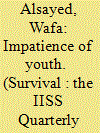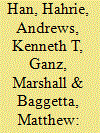| Srl | Item |
| 1 |
ID:
132470


|
|
|
|
|
| Publication |
2014.
|
| Summary/Abstract |
Youth movements in the Gulf have been effective but ephemeral, sometimes manipulated by established groups or succumbing to social divisions.
In October 2012, thousands of citizens took to the streets of Kuwait City to protest an emergency decree by the emir that amended the country's electoral law in such a way as to undermine the position of the opposition within parliament. The demonstrations were unprecedented both in size and political rhetoric. An estimated 50,000 people addressed the ruler with slogans such as 'we will not let you'. Security forces used tear gas and stun grenades to break up the gatherings. Youth groups formed the backbone of the movement's leadership (at least initially) and supplied much of its rank and file. However, within months, this vibrant and defiant campaign had largely dissipated. Having failed to attain its goals, it was unable to maintain a permanent political presence. Throughout the Gulf region, other youth-led movements have suffered a similar fate. Once groups achieve their original goals or lose their initial momentum due to government resistance, they soon break down, often disappearing altogether from the political scene.
|
|
|
|
|
|
|
|
|
|
|
|
|
|
|
|
| 2 |
ID:
105366


|
|
|
|
|
| Publication |
2011.
|
| Summary/Abstract |
Member-based civic associations, or citizen groups, have two crucial roles in American democracy. They advocate for members' interests in the public arena, but also operate as Tocquevillian "schools of democracy" linking citizens to politics and equipping them with the skills of democratic citizenship. Yet scant research has examined the interrelationships of these two roles. Does the work that civic associations do in developing democratic participants enhance the work they do advocating for members' interests in the public arena? We bring together two previously disparate strands of research on civic associations by arguing that a key factor affecting the political presence of civic associations is leadership quality. We focus on the relationship of leadership quality to political presence, using data from a unique 2003 study of 226 local entities of the Sierra Club. We show that organizations with more skilled and committed leaders have higher levels of political presence. This contrasts with previous research that has focused primarily on community context and resources as explanatory factors. This study shows that political presence is related to the extent to which leaders develop their skills and demonstrate commitment to the organization.
|
|
|
|
|
|
|
|
|
|
|
|
|
|
|
|